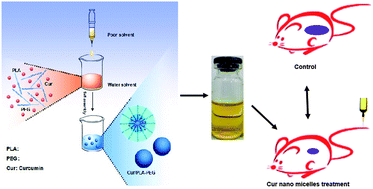Improving the anti-colon cancer activity of curcumin with biodegradable nano-micelles
Abstract
Curcumin (Cur) showed an antitumor effect by anti-angiogenesis and the induction of apoptosis. However, curcumin is limited in clinical applications by its hydrophobicity. Therefore, improving the water-solublilty and antitumor effect of curcumin are very meaningful. In this work, biodegradable monomethoxy poly(ethylene glycol)poly(lactide) copolymer (MPEG-PLA) micelles were employed to deliver curcumin by a self-assembly method. The obtained curcumin loaded polymeric micelles (Cur/MPEG-PLA) with a drug loading of 8% were monodisperse and ∼30 nm in diameter, which could release curcumin in an extended period in vitro and in vivo. In addition, Cur/MPEG-PLA showed a larger effect on cell growth inhibition and the induction of cell apoptosis than free curcumin in vitro. Furthermore, the therapy efficiency of Cur/MPEG-PLA on a colon cancer mouse model was evaluated in detail. Cur/MPEG-PLA could cause a more significant inhibitory effect on colon tumor growth than free curcumin with the same dose (P < 0.05 or P < 0.05, respectively), which indicated that Cur/MPEG-PLA could improve the antitumor effect of curcumin in vivo. Immunohistochemical and immunofluorescent analysis showed that Cur/MPEG-PLA could induce more tumor cell apoptosis, and inhibit more angiogenesis than the free drug group. Besides, Cur/MPEG-PLA exhibited a larger anti-angiogenesis effect in vivo. Finally, the anti-lung metastasis efficiency of Cur/MPEG-PLA on the colon cancer model was evaluated. Cur/MPEG-PLA could cause a more significant inhibitory effect on lung metastasis than free curcumin with the same dose (P < 0.05), which indicates that Cur/MPEG-PLA could improve the anti-lung metastasis effect of curcumin in vivo. Our data suggested Cur/MPEG-PLA may have potential clinical applications in colon cancer therapy.


 Please wait while we load your content...
Please wait while we load your content...